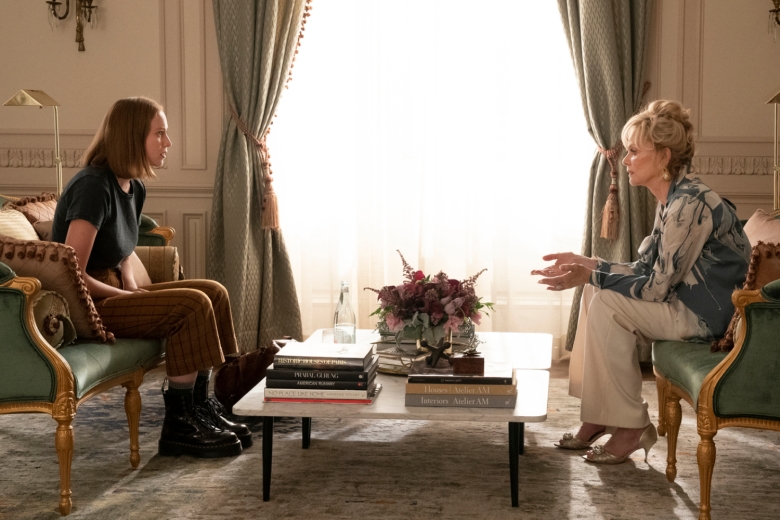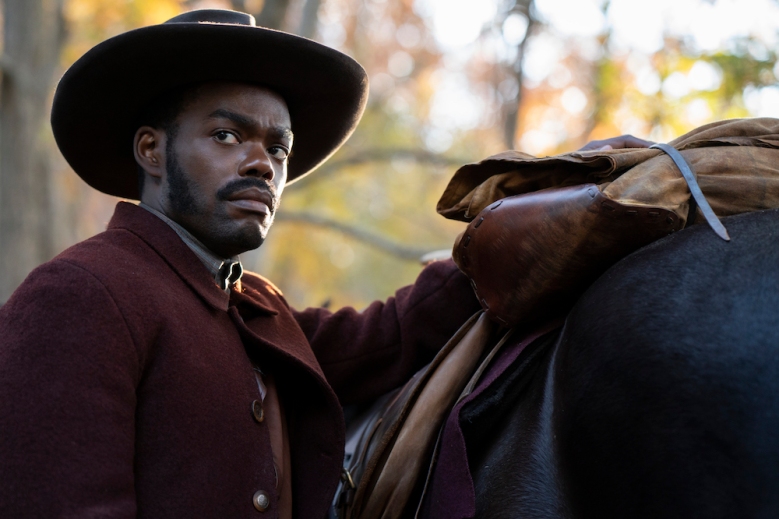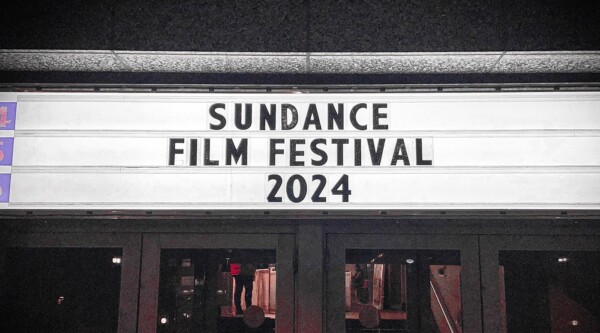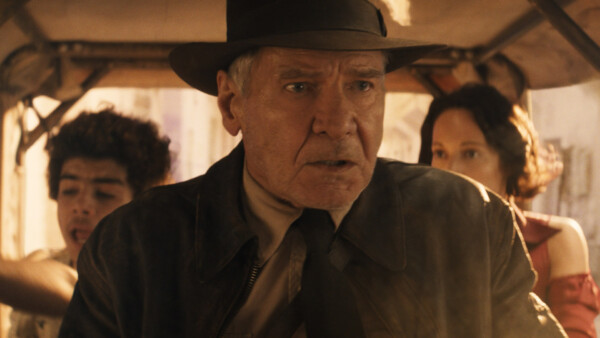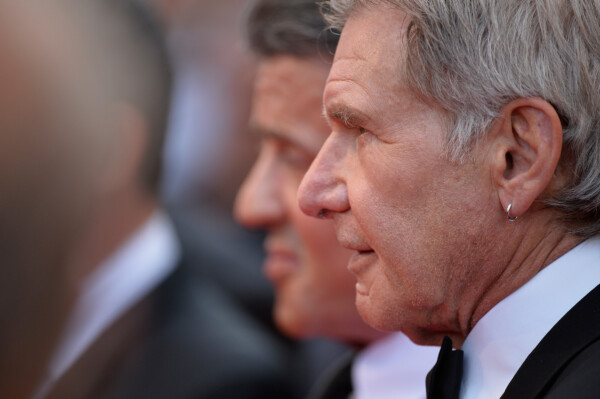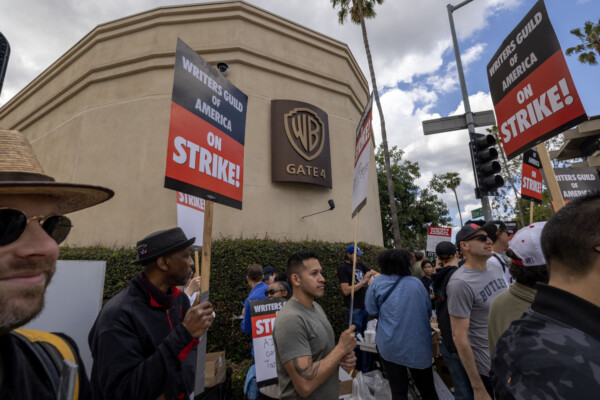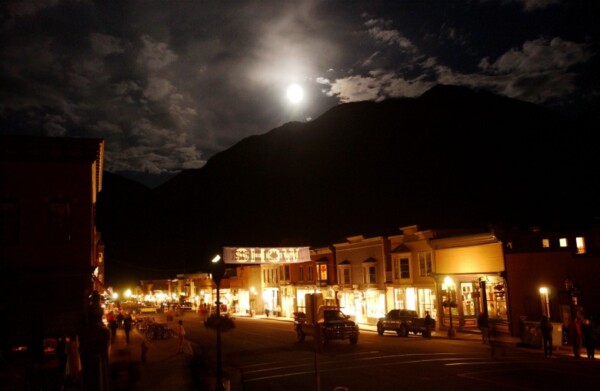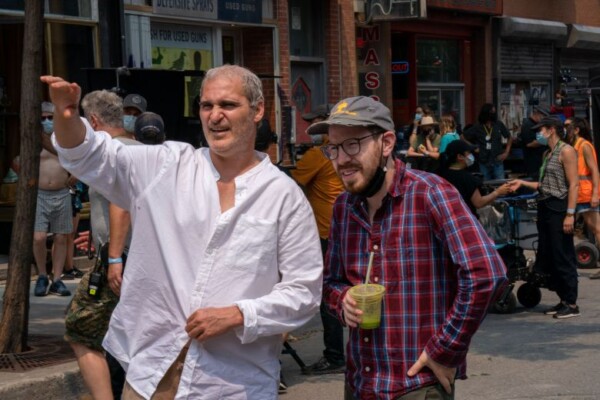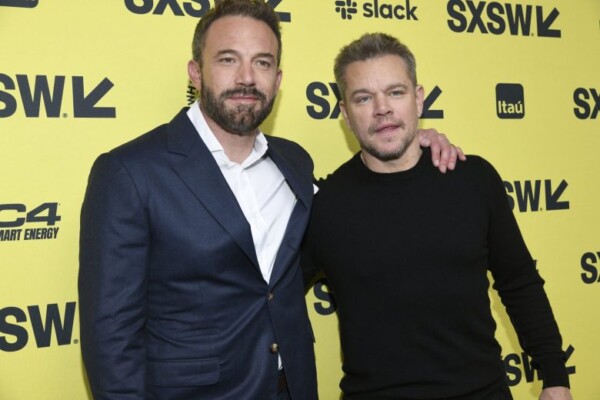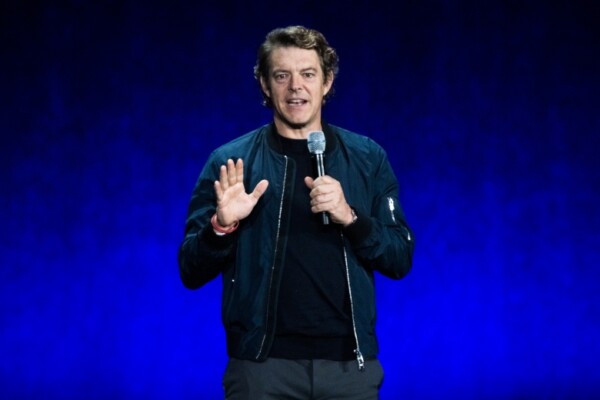The video above was produced by IndieWire’s Creative Producer Leonardo Adrian Garcia.
There are TV creators, and then there are TV creators who love TV.
To be clear, plenty of producers and showrunners enjoy making TV, and many of those are pretty good at pretending, at least, to take some pleasure in talking about what they’ve made. But people who make television usually don’t have a lot of free time. Between 12-hour days on set, just as much time in pre- and post-production, and then the most agonizing endurance test of them all — press days — creating television can make it pretty difficult to watch television, let alone keep up with the peak TV era and its never-ending content stream.
So if a TV creator can stay even somewhat current on television, it tends to indicate they really want to watch TV because, you know, they like it. They’re curious. They’re invested in what their peers are doing with the medium. They want to be engaged in what people are talking about, just like they want to create the thing that gets people talking next.
I believe Rob McElhenney is one of these people. His shows, by themselves, are a bit of a tip-off. “It’s Always Sunny in Philadelphia” plays with genre, tone, structure, and story in ways that comment on television and push it forward. “Mythic Quest” is similarly ambitious, while taking a more serialized approach; its unconventional episodes (often called “standalones”) pop up unexpectedly, prioritizing key themes over progressing the plot — plus, the main plot just so happens to track a creative development team trying to build brand new, top-tier entertainment.
All this is to say that one of the reasons “It’s Always Sunny” has broken the record as our longest-running, live-action sitcom and both it and “Mythic Quest” remain two of the most acclaimed comedies on television is because McElhenney loves TV. In an age where the quickest shortcut to prestige is comparing your show to a movie, and the easiest path to an Emmy nomination for comedy is to bake in as much drama as possible, McElhenney’s shows distinguish themselves in that they are loudly and proudly TV, and loudly and proudly funny TV, at that.
And he’s not shy to talk about it.
It’s Not Comedy vs. Drama, It’s That Comedy and Drama Should Be Equal
During an appearance on “Late Night with Seth Meyers” this May, McElhenney issued a declaration. “I’m going to make an announcement right now: It’s harder to do comedy than it is to do drama,” he said. “That’s it. I’m saying it right now, full stop, come at me drama people.”
And they did, though perhaps not in the way McElhenney expected. A series of tweets from IndieWire’s own TV Awards Editor Libby Hill contradicted the showrunner’s claims and sparked a conversation between the two TV writers. McElhenney graciously agreed to guest on our podcast, Millions of Screens (which you can watch in full above), and there, after he chuckled through a dramatic reading of Hill’s quips, he clarified the basis of his complaints.
“What I was trying to explain [is that] those talk shows are comedy beats, so you’re trying to come up with fun sketches that you can talk about,” McElhenney said. “I thought, ‘Well, it might be fun if I start with the punchline,’ and the punchline would be, ‘Nobody respects Seth Meyers’ — which is obviously the opposite of the truth, but it’s always fun to give the host a little shit — and then if we walk backward from that, then maybe I can suggest that he knows what it feels like to be disrespected simply because you make comedy; that we’re sort of looked at as a second-tier form of entertainment — that it’s easy to do comedy, and really where the most important stuff is done is in drama.”
Therein lies a wealth of material to unpack, and McElhenney, somewhat surprisingly, was down to unpack it. The conversation veered into many corners of the cultural debate, starting with the fundamentals of writing comedy and drama: what makes people laugh vs. what makes people feel something.
“I don’t want to suggest that making drama is easy because it certainly isn’t. None of this is easy, especially to make it well,” McElhenney said. “I would just say that comedy is much more specific. There is not a global, agreed-upon set of presets that everybody can recognize that we all share, as far as comedy goes, because oftentimes comedy doesn’t transcend culture; in fact, it’s often times specific to culture. So right off the bat, it becomes a little more niche — what makes you laugh isn’t necessarily what makes somebody else laugh or what makes somebody else laugh.”
“Whereas, if you want to make somebody cry, you know, if you kick a dog on screen, people are going to have a visceral reaction all over the world — all over the world! It’s going to horrify people, and that we share,” he said. “From a pathos perspective, falling in love, being in love, losing someone you love, those are all things we share. So when you go to the narrative well to figure out how I’m going to tell my story, you know if you need the audience to feel a certain way about this, you know you can go to that well. Unfortunately with comedy, we just don’t have as deep of a well. On top of all that, we still have the same challenges of breaking a compelling narrative — something that someone wants to sit through for 30 minutes — and on top of that, we also have to figure out how to make it funny.”
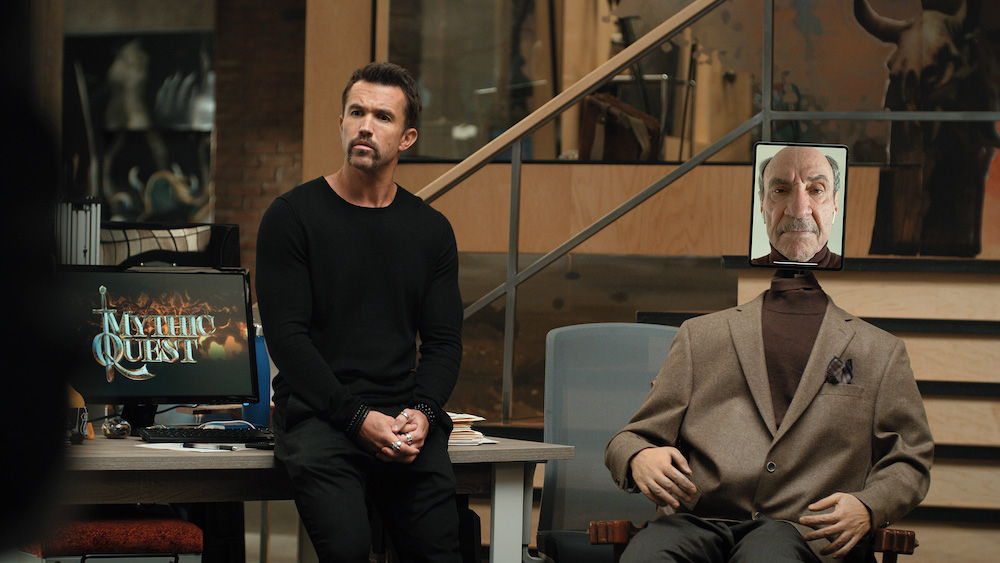
Rob McElhenney and F. Murray Abraham in “Mythic Quest”
Courtesy of Apple TV+
“Now, I’m not asking for people to feel sorry for people in comedy, or to play the tiniest violin,” McElhenney said. “I’m not suggesting that anybody who works in the field of comedy deserves any more credit or respect than those in drama. [But] it pains me when I see, read, feel, and hear that somehow drama is considered more important.”
“Important” is a loaded word when it comes to TV (and movies). Critics, networks, and studios all lean on the term and words like it — “significant,” “timely,” “essential” — to convey urgency around certain projects. Sometimes, it’s a marketing ploy to drive viewership. More often, it’s a prestige play, aimed at convincing awards voters to take this project seriously. Still other times it’s a sincere attempt to attract deserved attention — but those words are typically reserved for dramas, and when they’re describing comedies, it’s often not talking about “important” jokes.
“When you’re sitting around with your friends having drinks, if everyone is crying, you’re probably not having the best time,” he said. “But if everybody is laughing, it seems like everybody is having a pretty good time. So shouldn’t that be held in the same esteem as something dramatic? And whenever I hear someone say, ‘Oh, I think it is,’ all you have to do is look around and see what the Best Picture nominations are every year, or even just that the Best Drama in the Emmys, or what have you, is always considered the big award. The [Best] Comedy is like, ‘Eh, that’s just what the clowns do.’”
McElhenney’s efforts to shift the culture toward respecting comedy as much as any other genre may be self-serving, but he’s been banging this very drum for years now. “It’s Always Sunny,” after all, focused an entire episode (2013’s “The Gang Tries Desperately to Win an Award”) on sacrificing your vision and catering to the status quo, all for a little recognition from your peers. After 14 seasons, “It’s Always Sunny in Philadelphia” has only three Emmy nominations, all in the same category (Stunt Coordination), and none since 2015. “Mythic Quest” received zero nominations for its first season, and Season 2 is eligible this year.
Despite the lack of prominent awards recognition, McElhenney has amassed a number of rave reviews from his peers. “Game of Thrones” creators David Benioff and D.B. Weiss were so into “It’s Always Sunny in Philadelphia,” they wrote an episode of Season 9 and returned for cameos in Season 12. This year, McElhenney didn’t have a journalist or actor moderate “Mythic Quest’s” FYC panel; he asked “Watchmen” and “Lost” showrunner Damon Lindelof. (The two neighbors often go on walks together, and McElhenney said the only “problem” is they could talk about television for “hours” — “I never want it to end.”)
“At different points [in] ‘Sunny’s’ run, I got a call from Vince [Gilligan] and I got a call from Matt Weiner, amongst a few other [showrunners],” McElhenney said. “They said, ‘You know, when the writers are all sitting around and talking about breaking stories, what winds up happening is we eventually start talking about ‘Sunny.” And I said, ‘Really? Why?’ And they said, ‘I don’t know. We just have a few writers on the show, and they’ve evangelized everybody. People are watching it’ — which of course makes us feel fantastic because we’re getting the respect of our peers, and we love those shows as well. We love to hear that Vince Gilligan and the people who wrote ‘Breaking Bad,’ or Matt Weiner and the people who wrote ‘Mad Men’ love ‘Sunny’ because we hold them in such high esteem — and then they’re saying the same thing about us. The difference is that the industry does not feel the same way.”
Here, McElhenney emphasizes that he’s not complaining; he’s just “interested” in the imbalance. Either way, when he gets worked up again, it’s hard to blame him.
“The only reason that I think the conversation is important is because these awards really do matter,” he said, providing an example from another prominent artist. “Barry Jenkins was just talking about this — about how, ‘Are millions of people really going to see ‘Moonlight’ if it doesn’t get nominated and eventually win Best Picture?’ No. There’s a reason people sought that movie out, and you see the giant spikes [in box office] when these conversations start talking about what’s going to be awarded.”
“Is it ego stroking? Of course. Is it slapping ourselves on the back? Of course. Is the pageantry of it all absolutely ridiculous? Yes, and we can all recognize that,” McElhenney said, “but at its core, it really is valuable to talk about what we value culturally and what we all consider collectively as art — the things we celebrate, the things we agree are good and are progressing us forward, progressing our industry forward, progressing our culture forward, and progressing the art-form forward. So when you get left out of those kinds of conversations, it really harms a lot of shows that should be watched, and that’s unfortunate.”
While making his point, McElhenney never mentions “Mythic Quest,” but it’s clear his latest creation is one of these shows. Apple TV+ has yet to pick up the series for a third season. McElhenney and the cast have been doing their part in promoting the current batch of episodes (including the finale on Friday, June 25), but it’s hard to tell if the program has broken through in its sophomore season. Awards buzz has remained elusive, despite a plum release date that runs through the TV Academy’s two weeks of voting.
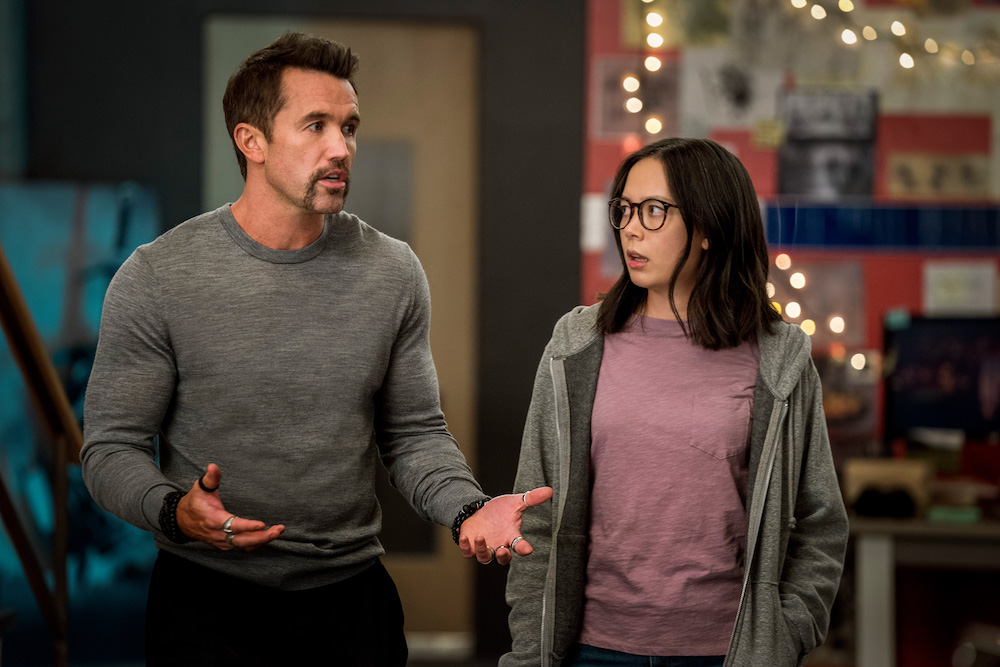
Rob McElhenney and Charlotte Nicdao in “Mythic Quest”
Courtesy of Apple TV+
“That Was Unexpected”
Just talking about a lack of Emmy recognition is a way of drumming up support, but I don’t think that’s McElhenney’s angle; not after a conversation we had earlier, before guesting on Millions of Screens and before his appearance on “Late Night, ” where the showrunner is a bit hesitant to discuss his own acting bonafides.
Conducted over Zoom from McElhenney’s kitchen, our first interview was originally intended to focus on a specific scene from Episode 8, “Juice Box,” in which his character, Ian (pronounced Eye-on), is in the hospital after suffering what he thinks was a heart attack induced by overwork. It’s a poignant scene, where Ian is put in a vulnerable state and asks his co-creative director Poppy Lee (played by Charlotte Nicdao) to meet him there, again, after she refused to let her guard down only a few days prior.
“At one point she says to him, ‘You look like a little boy,’ and he would never allow himself to look like a little boy in front of anybody, let alone Poppy,” McElhenney said. “What we realized is that Poppy is the only one that he would allow himself to be vulnerable in front of, which we’ve set up in a previous episode, yet he still felt like he could justify [being vulnerable] because he had a heart attack [from] working himself so strenuously for the thing that he loved — that it was almost like heroic — only to find out that he passed out because he couldn’t eat anything because his tummy hurt.”
That revelation is a beautiful example of how “Mythic Quest” finds room for comedy in its dramatic moments, and the scene is made all the stronger by McElhenney’s performance. Sometimes, to take notice of great character work, you have to see the character in a new light. “Juice Box” highlights the many choices McElhenney made in building Ian up to that point by revealing a fresh side of his psyche. Lying there, stripped of the vain game developer’s form-fitting black shirts, macho posturing, and his cocky demeanor, McElhenney channels the betrayal felt by his character when Poppy ignored his previous gesture as well as the fear of a man who doesn’t allow himself to show anything but courage. It’s not big, it’s not showy, it’s just honest.
It’s also the kind of scene you might see during an awards show, but it takes a few questions before McElhenney gives in and discusses this particular facet of his work.
“When I’m laying there with Charlotte, it’s not hard to access those things emotionally, because I was feeling those things for so many different reasons,” McElhenney said. “I realized at one point, and I don’t even think it was scripted, that I’m crying in the scene. At one point I was sitting there, Charlotte touches my hand, and I just remember I started crying.”
“That was unexpected. I think it was because I realized that our two characters very rarely touch each other in any way. But I [also] realized that in the middle of a pandemic, I hadn’t really touched anybody except for my family members. None of us were embracing on set. We were obviously very physically distanced. So to have somebody touch your hand was oddly moving. And so I just took it and ran with it. And she’s such a great scene partner that I think it just worked that way.”
New things are part of what drives McElhenney to keep making TV. He’s spoken repeatedly about bringing in fresh voices to his writers’ rooms, especially over the last 10 years, and he cites his body transformations and learning to dance as two recent opportunities to push himself.
“Whether the characters can remain myopic or not, I don’t believe that the showrunners should, because then the show can’t evolve,” he said. “The characters might not evolve, but the show needs to evolve. So then how can I do that when I’m sitting down to go into the writers’ room and sitting down to plan out the next season of the new show? I have to look at it like, ‘OK, well, why am I doing this anymore? Do I just want to make another TV show that goes for 15 years? Or do I want to do something that continues to challenge me and scares me a little bit and gives me the opportunity to do something I’ve never done before?’”
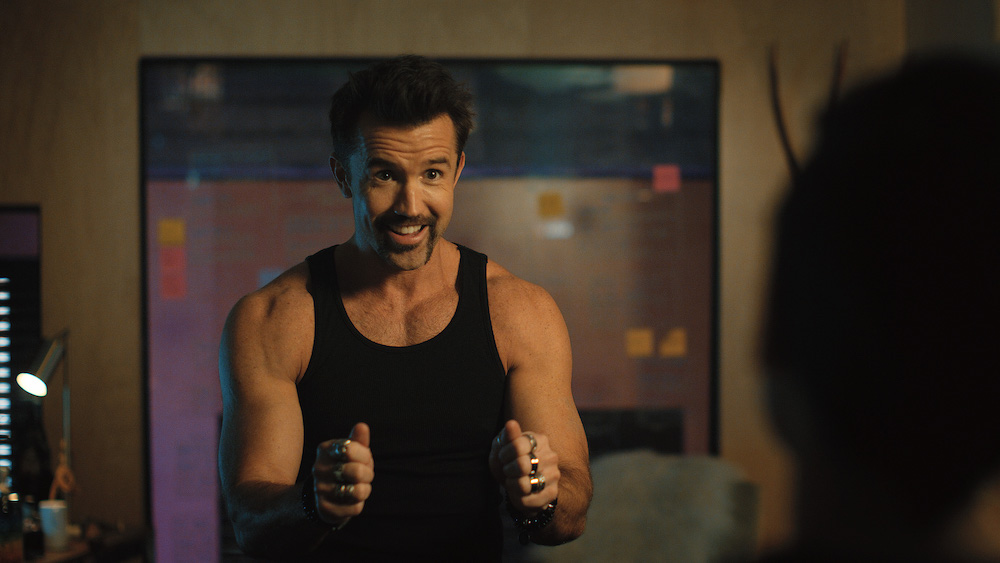
Rob McElhenney in “Mythic Quest”
Courtesy of Apple TV+
“I like that someone who loves the show doesn’t like all of them.”
Perhaps that’s why McElhenney brought up one more topic on the podcast: a bad review. It’s not even a bad review, just a questioning paragraph within a glowing review, written by yours truly. While most critics fell hard for Season 2’s pattern-busting episode, “Backstory” — which jumps back in time to chart a young C.W. Longbottom’s early days working at a science fiction magazine, before he grows up to become Mythic Quest’s head story writer — I wrote that the bold move didn’t pay off; that the narrative’s pseudo-flashback proved to a stumbling block for an office comedy building propulsive momentum through its ensemble, and explaining an enigmatic character like C.W.’s backstory deprived viewers of imagining their own impossibly wild history for the outlandish writer (views echoed by Ms. Hill).
“I totally appreciate your answer, and I’m not trying to talk you into liking something you don’t like,” McElhenney said. “What we’re trying to do often times with the show is to present something unexpected, and I hope that’s a strength of the show; that we’re not going to keep delivering the same thing week after week, even though we love the ensemble as well, and we love the traditional model of sitcoms — I grew up with it, and I love it — and I love ‘The Office,’ I love workplace comedies, but I also love the idea of maybe playing with the form.”
As for C.W., McElhenney said he knew the character wasn’t one that a lot of people were eager to empathize with or understand better, but that’s all the more reason to try.
“At the end of the day, it’s a fine line between presenting a case for why somebody is who they are, and justifying why he behaves the way he does,” he said. “So we hope [the episode] fosters empathy and compassion, which we would suggest should transcend anyone and everyone — everyone is deserving of that — however, where that line gets crossed is when you use that empathy and compassion to justify that anybody’s behavior at any give time is appropriate. That’s where we were really careful with C.W. So it’s interesting that the reasons you said you didn’t like it were almost the exact reasons why we made it.”
These are great, thoughtful reasons to write an episode. Whether or not they’re successful in action is up to the subjectivity of the viewer; the same subjectivity that makes comedy so specific to an audience, even when in an episode that’s a bit more dramatic. It doesn’t matter if we agree; what matters is that the thoughtfulness goes both ways.
“I like that someone who loves the show doesn’t like all of them, if that makes sense. I think that’s kind of cool,” McElhenney said. “When people like something, but they like it for different reasons, it’s constructive. It’s like, ‘Oh, right, that gives me some guidance into the way the show is being viewed.’ Ben could not have written a more glowing review of the show. However, ‘Backstory’ — which by far and away is the best-reviewed episode by the fanbase — it was like a ‘meh’ for him. And I just find that fascinating.”
Such curiosity leads to questions, which lead to a variety of answers, which informs better collaboration, which makes for better television. McElhenney prefaced our entire discussion about “Backstory” by saying he only brought it up because he loves television. “I love talking about it, I love watching it, it’s been a huge part of my whole life, and I love not only spreading the word of what other great shows are out there, but I love dissecting what it is that makes great show,” he said.
But he doesn’t hold it too tightly.
“It was interesting that Damon just said to me, was, ‘As a showrunner, what you have to continually do is to cede power,’” McElhenney said, remembering some advice from Lindelof on their recent walk. “If you’re a good showrunner and a good collaborator, you’re doing something that is not hard to do, which is cede control. And that is a huge part of what I think is the success of ‘Sunny’ and the success of ‘Mythic Quest’ is that I truly just try to surround myself with people who challenge me personally, who challenge the show, who challenge the preconceived conceptions, the preconceived notions of what it is to make a television show or to tell a story. And then we just kind of hash it all out together.”
What a great way to create — almost as if he loves the entire process.
For more from McElhenney on “Mythic Quest,” his writing process, and more, watch the full video interview above. “Mythic Quest” is available to stream on Apple TV+. Rob McElhenney is eligible for Best Actor in a Comedy Series at the 2021 Primetime Emmy Awards, and “Mythic Quest” is eligible in all Comedy categories.
“Millions of Screens” is available on Apple Podcasts, Breaker, Google Podcasts, Spotify, and Stitcher. You can subscribe here or via RSS. Share your feedback with the crew on Twitter or sound off in the comments. Review the show on iTunes and be sure to let us know if you’d like to hear the gang address specific issues in upcoming editions of “Millions of Screens.” Check out the rest of IndieWire’s podcasts on iTunes right here.
Sign Up: Stay on top of the latest breaking film and TV news! Sign up for our Email Newsletters here.
Текст выше является машинным переводом. Источник: https://www.indiewire.com/video/mythic-quest-rob-mcelhenney-awards-matter-bad-review-interview-1234646571/




